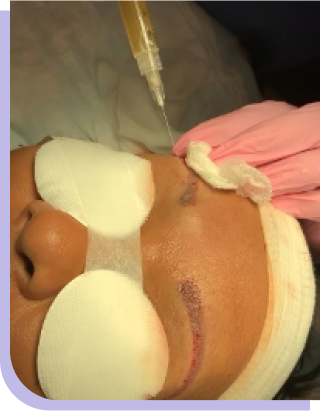Non-Surgical Hair Restoration
Non-surgical hair restoration treatments are used as an adjunct to both medical therapy and surgical hair restoration. These are scalp-directed therapies that increase the likelihood of regrowth. As long as viable hair follicle stem cells remain in the affected area, the hair loss may be reversible.
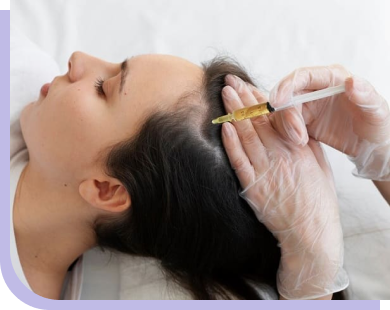
Bio Regenerative Therapies
These therapies deliver growth factors to the thinning hair follicles. With thinning hair, dermal papillar cells that lie below the hair bulb reduce in number. Growth factors can signal those cells to amplify, increase vascular supply, and collagen production around the hair follicle. There are multiple methods to introduce growth factors into the scalp.
Before/After Bio Regenerative Injections
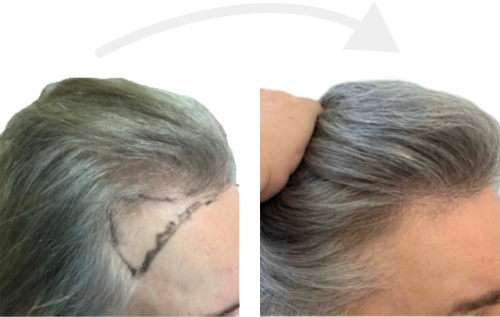
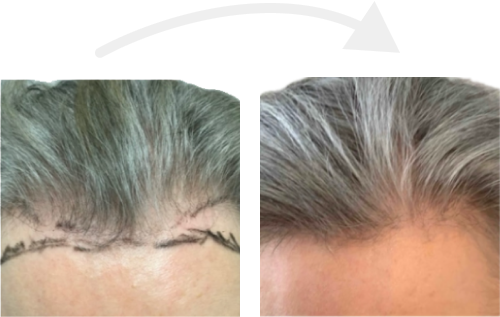
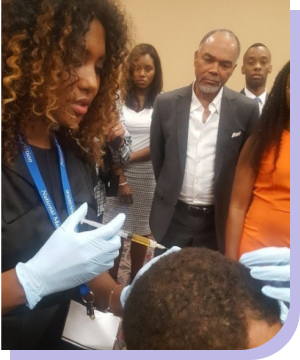
Platelet Rich Plasma (PRP) Injections
PRP is a preparation of the patient’s own blood product. The patient’s blood is drawn and placed in a centrifuge. The platelet rich plasma is gathered and the red blood cells and white blood cells are discarded as contaminants. The PRP is activated and processed to form Platelet Rich Fibrin Matrix (PRFM) and then injected into the scalp evenly throughout the affected area. 3-4 treatments every 4-6 weeks are recommended with maintenance as needed.
Topical Growth Factors
Laser-Assisted Growth Factor Delivery
With laser-assisted growth factor delivery, a proprietary topical growth factor solution is introduced after a device is used to create channels to allow absorption. This procedure is painless! The device uses the latest technology to painlessly create scalp micro-incisions and acoustic waves to increase microcirculation, tissue oxygenation, and deliver the active ingredients. 4 sessions every 3 weeks are recommended with maintenance treatment as necessary.
Microneedling
Microneedling devices create micro channels in the skin that induce wound healing properties and likely induce platelets to release their growth factors as well. We perform microneedling in conjunction with our platelet rich plasma treatments as it has been shown to increase the efficacy of the procedure. We also utilize microneedling to introduce topical growth factors into the scalp. We recommend 4-5 sessions every 1-2 weeks with a maintenance treatment 3-4 months later.
Mesotherapy
Mesotherapy introduces medications such as dutasteride, minoxidil, and bicalutamide directly into the scalp. It helps decrease the likelihood of possible side effects of these medications. They can be used in patients where these medications are contraindicated or not preferred and/or to enhance the effects of the oral medications. We will often combine this treatment with our bioregenerative therapies in the same session. We recommend starting with 3 sessions every month then repeating every 3 months if oral medications are not being taken.
Hair Loss in Coiled, Textured Hair
Dr. Singh is a world-renowned expert in medical treatment and hair transplantation to address alopecia in tightly coiled hair. Traction (link) and scarring alopecia are more common in this demographic.
Eyebrow Restoration
Many individuals seek consultation for restoration of the eyebrows. They may have naturally sparse eyebrows or have over-tweezed or plucked the area and simply want to thicken those areas. However, many have suffered from conditions, such as hypothyroidism or alopecia areata and desire complete eyebrow reconstruction. Eyebrow loss has various causes.
“Where Did Your Eyebrows Go”
For those of us born with unnaturally thick eyebrows, we were shamed into plucking them into thin lines back in the 1990s. Now that nice, full eyebrows are back in style; trying to regrow our over plucked eyebrows can be difficult. However, there may be other causes for eyebrow thinning. Some of these causes may be clues.
Causes
Trauma
As mentioned, tweezing our eyebrows may lead to permanent thinning in the area. This is due to a form of traction or traumatic alopecia. This leads to mild inflammation around the hair follicles.
Clearly, decreasing traumatic procedures to the eyebrows will reduce this form of thinning.
Aging
Sadly, we can blame numerous aspects of our lives on aging. In addition, it lead to thinning of the eyebrows. Over time our hairs can become finer and more dry.
Hypothyroidism
Thyroid abnormalities can affect metabolism and protein synthesis.
This can lead to brittle, dry, shedding scalp hair. In addition, it can lead to thinning of the ends of the eyebrows.
Alopecia Areata
Alopecia areata is autoimmune disorder where immune complexes attack the hair bulb. This leads to circular patches on the scalp and beard. If the eyebrows are affected, it will typically manifest as patchy areas of eyebrow loss. It may lead complete loss of eyebrows.
Frontal Fibrosing Alopecia (FFA)
FFA is a form of hairloss that most commonly occurs in postmenopausal women. It causes smooth, band-like hairline recession over the frontal scalp, patchy eyebrow loss, and sometimes body hair loss. There may be noticeable red spots around the hair follicles in the affected areas. This entity may also lead to a prematurely aged appearance with a change in texture, discoloration and increased fine lines on the face.
Treatments
The most important aspect of treating eyebrow loss is identifying the underlying cause. For eyebrow loss due to alopecia, steroid injections or topical creams may help. For most types of eyebrow loss, topical prostaglandin products may increase the thickness, despite underlying cause. In addition, there are numerous types of camouflages available, for example, microblading (link to pics), tattooing, and makeup brow kits. We also offer eyebrow hair transplant in applicable cases.
In conclusion, eyebrows are back in style. For those of us that have less than we used to, identifying the cause may lead to more targeted treatment, and hopefully fuller eyebrows!
Eyebrow transplantation is similar to hair transplantation, in that follicular units are harvested from the back of the scalp and transplanted into the desired area. To appear as natural as possible, single hair follicular units are used. Because the hairs are taken from the scalp, the eyebrows will need to be trimmed every couple of weeks.
We also offer eyebrow microblading which deposits pigment under the skin to mimic the appearance of hairs. Often the two techniques can be combined to give the most natural appearing, long lasting result.

